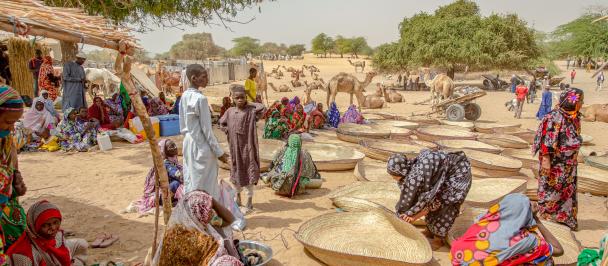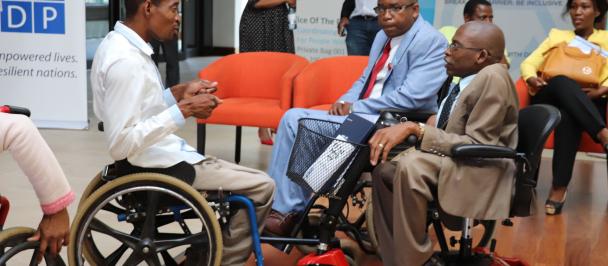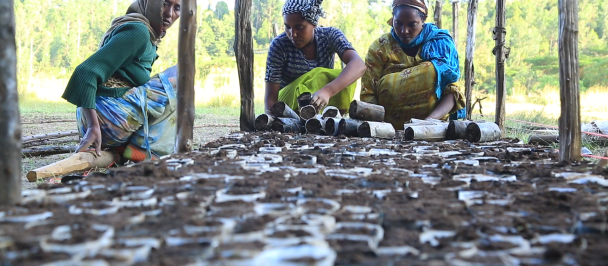Excellency Ambassador,
Distinguished Members of the Executive Board
I. Preamble
On behalf of UNDP senior management, I would like to thank Director Indran Naidoo and his team in the Independent Evaluation Office for the work conducted in 2018, and for putting together this thorough report.
We appreciate the collaboration with the Evaluation Office and look forward to continuing working closely together. I would also like to re-instate senior managements’ commitment to ensure that learning from evaluation is at the center of the agenda and informing decision-making.
II. Positive developments and findings
As part of UNDP efforts to invest in becoming a more results oriented, evidence-based organization, we take particular note of the following positive findings reported on in the 2018 annual report on evaluation, which we will consolidate to further improve our development, efficiency, effectiveness and impact:
Key findings of the three 2018 thematic evaluations:
- UNDP has the largest geographical footprint of operational services among all United Nations entities, and is currently serving over 80 of these organizations in about 170 countries;
- The Multi-Partner Trust Fund Office has established itself as a strong, credible and neutral provider of pooled financing services, and is recognized by most donors and agencies as the preferred choice for an administrative agent.
- UNDP poverty reduction programmes and priority areas are highly relevant for the LDCs, and UNDP remains the agency of choice in LDCs for policy and implementation support.
The revision of the evaluation guidelines led by the IEO in close consultation with the Bureau for Policy and Programme Support, Regional Bureaus and Country Offices, reflect UNDP commitment to evaluation and its desire to improve evaluation quality, credibility and usability in capturing lessons learned and ensuring future work is informed and strengthened by past experience.
Through the 2018 Results Oriented Analysis Report, UNDP strengthened its efforts to disaggregate evaluation related expenditures, and delineate reporting on monitoring and evaluation expenditures.
The completed 2018 independent country programme evaluations found that UNDP overall has solid relationships with Governments, the capacity to respond and adapt to emerging needs, and successfully supported countries in implementing the 2030 Agenda for sustainable development and the SDGs.
UNDP’s financial investment in the evaluation function continues to increase. The 2018 total expenditures on evaluation of $22.08 million indicates an increase of 11% compared with $19.85 million in 2016. The IEO allocation was in line with the annual budget for the IEO, approved by the Executive Board in 2018, and the 0.2% benchmark (0.19% in 2018).
The percentage of evaluation reports rated moderately satisfactory, satisfactory or highly satisfactory increased from 72% in 2016 to 76% in 2018, and more importantly the percentage of evaluations rated satisfactory increased from 19% in 2017 to 25% in 2018. The Arab States and the Europe and CIS regions have in particular significantly improved the quality of their evaluations.
III. Challenging findings
The report highlights challenges related to evaluation plan design and implementation. We acknowledge that out of the 504 evaluations planned in July last year, only 56% were completed. We also note the decreased overall number of evaluations, particularly for UNDP project evaluations. While 500 evaluations might not be realistically implemented in one year, UNDP usually does around 300, what is key is that there is evaluation coverage of our programmes to ensure accountability and learning.
To address this:
- The revised guidelines specify the evaluations that are mandatory and projects that require an evaluation. They also spell out how to strengthen design, implementation and review of evaluation plans, knowledge which is reinforced through regional workshops and webinars that are currently carried out;
- We have strengthened the Headquarters Programme Appraisal Committee quality review of Country Programme Document evaluation plans;
- An annual Organizational Performances Group review of the evaluation function will be established to improve management accountability;
- A quarterly review and dialogue on evaluation issues and knowledge sharing between BPPS, IEO, RBx, UNV, UNCDF takes place; and
- The Evaluation Resource Centre now sends out regular notification reports on the programme units’ status of implementation, as well as upcoming and overdue evaluations and management response.
Challenges in adhering to the 1% financial benchmark relate to the decentralized nature of UNDP’s programme evaluation budgets. Consistent with our cost-recovery policy and procedures, allocations for decentralized evaluations are required to be included in programme and project budgets.
UNDP has committed to investigate the feasibility of establishing a reporting mechanism for evaluation expenditures to improve reporting on financial and human resources.
Challenges related to the quality of decentralized evaluations has been a recurrent topic of discussion. We take the fact that 24% of the quality assessed evaluations were of unsatisfactory quality very seriously. A series of efforts have already been undertaken: strengthened quality assessment process for decentralized evaluations, updated Evaluation Resource Centre, regional evaluation workshops and revised evaluation guidelines.
UNDP and the IEO also continue to work closely to address the challenges. For example, by rolling out the guidelines through regional workshop (RBEC in Feb 2019, RBA in June 2019). Webinars on various topics are also being conducted throughout 2019.
IV. Concluding remarks
In conclusion, I would like to reiterate UNDP’s commitment to further enhancing the evaluation function. We consider evaluations key to ensure that the organization further improve our programmatic and operational approaches, tools and decision-making.
We will continue to build on areas where we are doing well, and further analyze and work on areas where we need to do more. We hope that the revised guidelines, and the actions planned in response to the evaluation policy review will help this process.
I thank you for your attention.

 Locations
Locations



